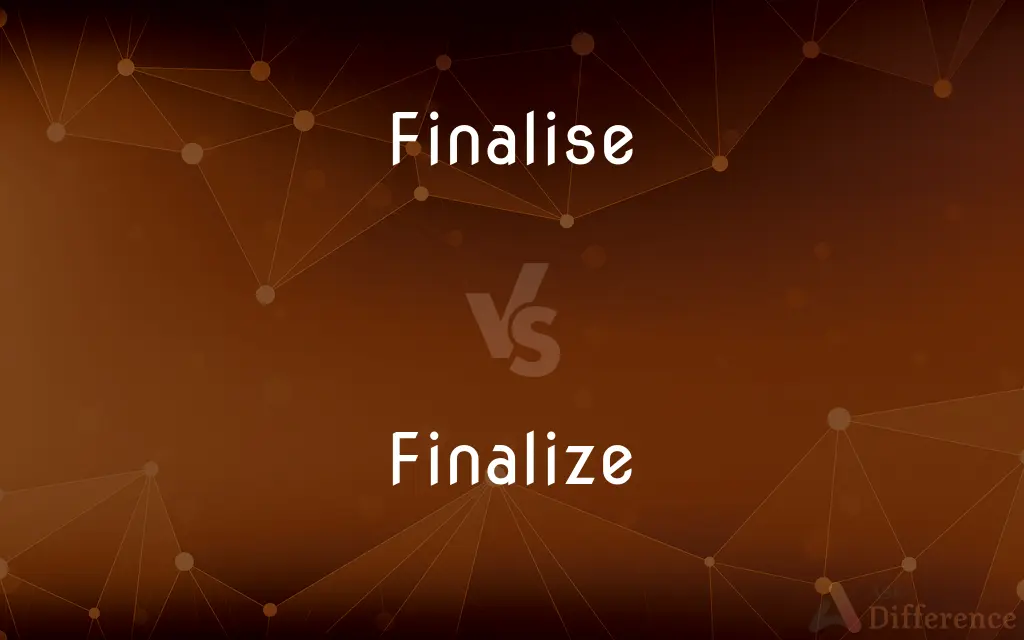Finalise vs. Finalize — What's the Difference?
By Tayyaba Rehman — Updated on April 9, 2024
"Finalise" and "Finalize" both mean to complete the last part or process, but "Finalise" is British English and "Finalize" is American English.

Difference Between Finalise and Finalize
Table of Contents
ADVERTISEMENT
Key Differences
"Finalise" and "Finalize" essentially carry the same meaning, referring to the act of completing or concluding something. The distinction between them lies in their regional usage. "Finalise" is the preferred spelling in British English, while "Finalize" is more commonly used in American English.
Though the words "Finalise" and "Finalize" diverge in spelling, they converge in semantics. They both denote the culmination of a process or the resolution of matters. When one says they are trying to "finalise" or "finalize" a deal, it suggests they are concluding negotiations.
The usage of "Finalise" is predominant in countries that follow British English conventions, such as the UK, Australia, and New Zealand. In contrast, "Finalize" is primarily adopted in the United States and other places where American English prevails.
Publications and documents, especially those that have a targeted audience, might prefer one variant over the other. For instance, a British magazine would most likely use "finalise," while an American newspaper would lean towards "finalize."
Regardless of the variant, the intent remains the same. Whether you "finalise" a report or "finalize" a contract, you're bringing it to its ultimate or finished state.
ADVERTISEMENT
Comparison Chart
Origin
British English
American English
Meaning
To bring to completion
To bring to completion
Common Usage Locations
UK, Australia, New Zealand, and other Commonwealth countries
Primarily the United States
Derivation
From the word "final."
From the word "final."
In Sentences
"They will finalise the plans tomorrow."
"They will finalize the plans tomorrow."
Compare with Definitions
Finalise
To complete or settle.
They aim to finalise the paperwork by Friday.
Finalize
To make final or definite.
She will finalize the deal next week.
Finalise
To put in final form.
Let's finalise the presentation slides.
Finalize
To complete the last parts of.
We need to finalize the design by tomorrow.
Finalise
To make conclusive.
The team will finalise the decisions after the meeting.
Finalize
To confirm or establish.
We'll finalize the date soon.
Finalise
To resolve or conclude.
We must finalise the details before announcing.
Finalize
To end or conclude definitively.
They aim to finalize negotiations by the end of the month.
Finalise
To bring to an end.
We need to finalise the guest list.
Finalize
To bring to a finished state.
Let's finalize our plans for the trip.
Finalise
Standard spelling of finalize
Finalize
Complete or agree on a finished and definitive version of
Efforts intensified to finalize plans for post-war reconstruction
Finalise
Make final; put the last touches on; put into final form;
Let's finalize the proposal
Finalize
To put into final form; complete.
Finalize
(transitive) To make final or firm; to finish or complete.
As soon as we get the plane tickets, we'll finalize our reservations with the hotel.
Finalize
To prepare (an object) for garbage collection by calling its finalizer.
Finalize
To put the last touches on; put into final form.
Finalize
Make final; put the last touches on; put into final form;
Let's finalize the proposal
Common Curiosities
Why are there two spellings for the same word?
The difference arises from British and American English spelling conventions.
Is "Finalise" only used in the UK?
No, "Finalise" is used in the UK and other countries that follow British English conventions.
Can I use "Finalise" in an American publication?
While understood, "Finalize" is the preferred form in American English.
Do "Finalise" and "Finalize" have the same meaning?
Yes, both mean to complete or conclude something.
If I use "Finalize" in a British context, will it be considered incorrect?
It will be understood, but "Finalise" is the preferred British form.
In international documents, which form should I use?
It depends on the target audience, but using both forms or a neutral style guide may be advisable.
Can a British person understand if I use "Finalize"?
Yes, both forms are widely understood, regardless of the variant used.
Are "Finalise" and "Finalize" interchangeable?
Yes, they are interchangeable in meaning but differ in regional usage.
Are there any other words with similar regional variations?
Yes, such as "realise" (British) and "realize" (American).
Why is it important to distinguish between the two forms?
While the meaning is the same, using the appropriate form shows awareness of regional language nuances.
Is one form more formal than the other?
No, the formality is the same; the difference is regional.
How did these different spellings originate?
They evolved from differences in British and American English spelling practices over time.
Which form is used in Canada?
Canadian English often leans towards British forms, but "Finalize" is also common.
Are there pronunciation differences between the two?
No, both are pronounced the same way.
In which countries is "Finalize" more common?
"Finalize" is predominantly used in the United States and places influenced by American English.
Share Your Discovery

Previous Comparison
Watt vs. Horsepower
Next Comparison
Summertime vs. SummerAuthor Spotlight
Written by
Tayyaba RehmanTayyaba Rehman is a distinguished writer, currently serving as a primary contributor to askdifference.com. As a researcher in semantics and etymology, Tayyaba's passion for the complexity of languages and their distinctions has found a perfect home on the platform. Tayyaba delves into the intricacies of language, distinguishing between commonly confused words and phrases, thereby providing clarity for readers worldwide.














































